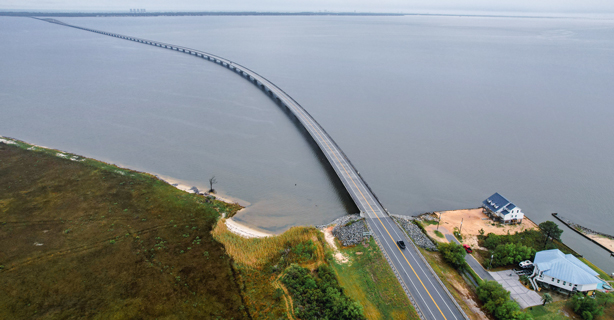Ride U.S. 98 from Pensacola to Crystal River on your motorcycle
0 min. read
Florida is well known for all-year motorcycle riding and some great motorcycle rallies. If your motorcycle riding experience in Florida is primarily based on attending Daytona Beach Bike Week or other bike rallies, we have a wonderful surprise for you. These big rallies are awesome, but they can be crowded and often require riding on busy interstates.
There's an entirely different motorcycle riding experience waiting for you along the Florida Panhandle and the northwestern coast of the Sunshine State. Motorcycle riders know that historic blue line highways often lead into forgotten parts of America, and U.S. Route 98 (U.S. 98) is one of those highways, allowing you to discover pristine and unheralded parts of Florida as it extends from Pensacola to Crystal River.
U.S. 98: One highway, plenty of variety
The character of U.S. 98 changes many times along your journey—from multilane divided highway to two-lane rural road. You'll ride the main streets of beach towns and alongside the Gulf Coast waterfront. You'll travel through expanses of Florida woodlands and discover communities a world away from the commercial tourist meccas of central Florida.
Navigating U.S. 98 in Florida
Our motorcycle journey covers about 400 miles and starts in the city of Pensacola. You'll begin by leaving Pensacola with a visual treat, taking U.S. 98 east over the Pensacola Bay Bridge. This will be the first of several bay bridges you'll cross on the way to this route's end point in Crystal River.
U.S. 98: Pensacola to Crystal River motorcycle route
Our interactive U.S. 98 route map shows the sweep of U.S. 98 as it wraps around the coast of the Florida Panhandle and along the state's western coast. Use this map as a starting point to build your own unique trip.
Weather along U.S. 98 in Florida
Florida's favorable weather makes the state a year-round motorcycle riding destination, but it still has its share of weather hazards, including hurricanes, tornadoes, and searing heat. To help you get a sense of when you'd like to ride this route, here are the monthly temperature and precipitation averages for Apalachicola, a coastal town you'll pass through as you ride.
Riding safely in the Florida Panhandle
U.S. 98 isn't a highly technical road, but you'll still need to stay alert—particularly as you enter and leave resort areas and other communities. Here are a few safety tips to keep in mind:
Keep an eye out for animals along the roadside, especially in wooded areas and near wildlife preserves.
Pull off the road to enjoy the dramatic seaside sightseeing. Drivers and motorcyclists alike can get distracted by the views, which can lead to sudden or unexpected maneuvers, and even accidents.
Expect commuter and tourist traffic, including RVs and vehicles towing trailers.
Don't be tempted to keep up with drivers and riders exceeding the speed limit and weaving around slow-moving and stopped vehicles. Ride at your own pace and follow the rules of the road.
Things to do along U.S. 98 in Florida
Along the nearly 400 miles you'll travel along U.S. 98, you'll find opportunities to camp, fish, and enjoy the recreational possibilities the Gulf Coast offers. There are many side trips you can take either toward the coast or inland to explore the numerous wildlife management areas and preserves. Here are three places to consider exploring:
Panama City Beach
Panama City Beach is a Gulf Coast resort town whose beaches are consistently ranked among the world's best. Sugar-white sands and warm gulf waters make Panama City Beach a great stopping point on your U.S. 98 ride. Avid motorcycle riders also know the city as the home of the Thunder Beach Motorcycle Rally.
Apalachicola and the Forgotten Coast
Apalachicola is a charming fishing town where you can enjoy a wonderful seafood meal and set up a base camp to explore the Apalachicola National Forest. It's also a central location on what's known as the Forgotten Coast of Florida. According to the Tourist Development Council of Franklin County, this area features “the last remaining stretch of unspoiled, pristine Gulf Coast beaches that haven't been overrun by high rises and strip malls.”
Crystal River
Crystal River is known as the Manatee Capital of the World. The Crystal River National Wildlife Refuge is the only national wildlife refuge in America dedicated to protecting the manatee. These incredible sea creatures migrate to this part of Florida during the cooler months, roughly the same time many motorcycle riders visit the state for a riding-friendly season.
Related Links
As you explore Florida’s northwestern coast, plan a side trip along the Ocala National Forest motorcycle route.
The general information in this blog is for informational or entertainment purposes only. View our blog disclaimer.
*Data accuracy is subject to this article's publication date.







